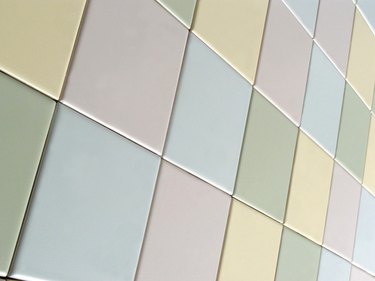
Installing ceramic tile in your home requires some type of adhesive. Pick the wrong type and you risk the tiles coming loose and potentially causing injuries from slips and falls. Fiberglass and ceramic tiles use the same type of tile adhesive. The type of adhesive you use depends on your skill level and where you place the tile in your home.
Thinset Mortar
Video of the Day
Thinset mortar consists of a powder that you combine with water. Depending on the manufacturer, the directions might require the use of an acrylic additive or come pre-mixed with the additive. Thinset mortars are best suited for ceramic or fiberglass tiles used as flooring because the adhesive supports large amounts of weight. The mortar also holds up well to moisture, which makes it a good choice for bathrooms or kitchens. The dark gray shade is best for darker colored grout, while the white shade works well with light grout.
Video of the Day
Pre-mixed Adhesive
If you have little experience working with tile or grout, opt for a pre-mixed adhesive, which comes ready for use. This type of adhesive is best for tiled walls because the adhesive cures quickly. As soon as you apply the adhesive to the walls, you can attach the tiles and the glue holds the pieces in place. Don't use a pre-mixed adhesive in a bathroom because water and moisture degrades the glue.
Cement Slurry
Cement adhesives are similar to thinset mortars. The mixture contains sand, water and cement, which has a thick consistency like the mortar. The adhesive forms a strong bond with ceramic or fiberglass, keeping the tiles from moving or slipping. You typically apply the mixture with a trowel and affix the tiles to the mixture. As the cement slurry has a thick consistency and rough texture, it's best suited for outdoor use.
Organic Adhesive
Organic adhesive is a specialized type of pre-mixed adhesive. The product is best suited for walls, but also works well in flooring applications. The adhesive has a thin consistency, similar to white glue. When used on walls, wait until the glue feels slightly tacky to the touch before attaching the tiles. Manufacturers sell Type 1 and Type 2 organic adhesives. Type 1 is suitable for areas with high moisture content or exposure to water, while you can only use Type 2 in dry areas. Type 2 works on floors only, but Type 1 works on both floors and walls.